'I want to stand up for every woman experiencing abuse'
- Published
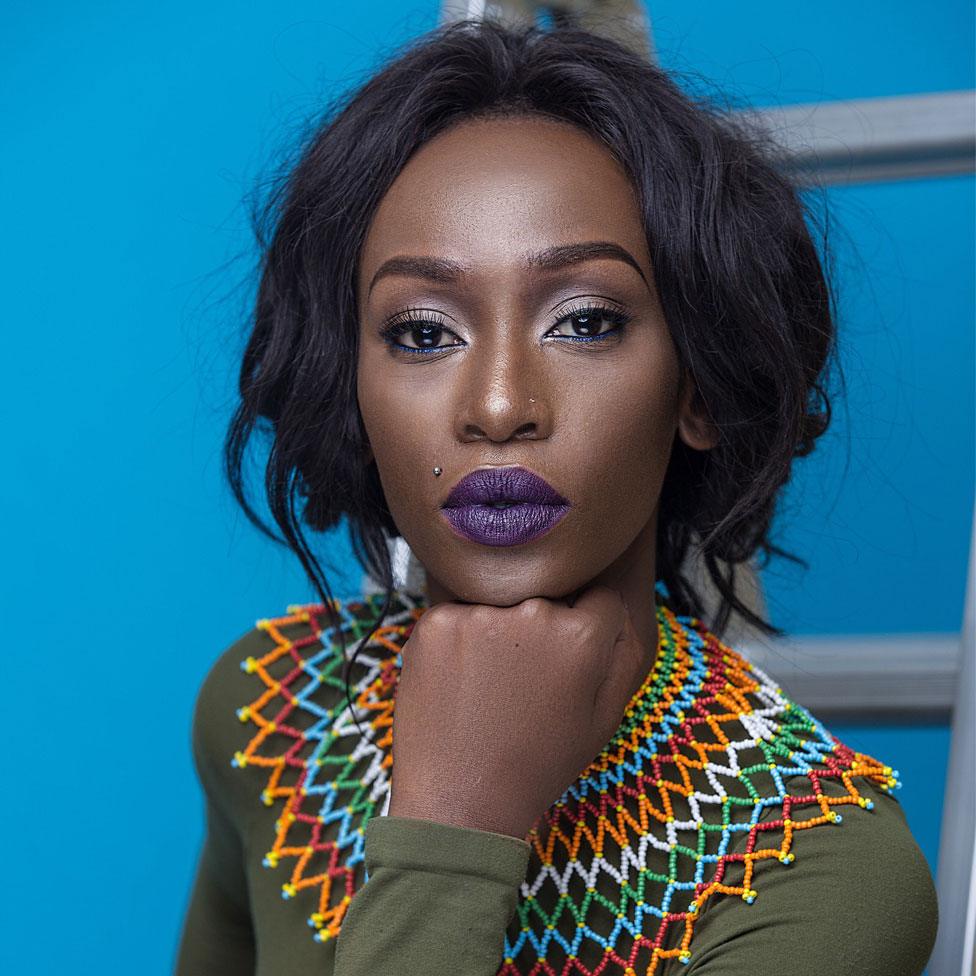

When nude photos of leading Ugandan model Judith Heard were published without her consent last year she not only found herself under arrest, but also under attack in the media and online. To break this pattern of victim-blaming, she is now urging Ugandan women to talk openly about sexual abuse - and to show solidarity with one another. She told her own story to Sophie Hemery and Alice McCool.
Some readers will find this story disturbing
She arrives for our interview in a borrowed £50,000 dress. She's a jetsetter and socialite, in London for some modelling engagements and charity events. On the surface, her life differs entirely from that of the average East African. But there is one thing Judith Heard has in common with many women in Uganda.
A survey conducted in 2016 found that 50% of Ugandan women aged between 15 and 49 had experienced physical or sexual intimate partner violence, external. Heard, whose pre-marriage name was Kantengwa, has experienced both. (We discussed with Judith which name to use for this story, and decided on Kantengwa, though she uses Heard for professional purposes.)
The publication of the nude photographs - downloaded, she believes, from a stolen computer or telephone - is just the latest in a long line of abuses she has suffered at the hands of men, she says. She has been silent about them for many years because she has been "scared to be embarrassed and humiliated".
"We are judged for this, so you keep it to yourself and end up getting your mind messed up psychologically," she says. "I've decided to tell my story because I want to be a free woman. I don't want to walk for the rest of my life with this heavy stone."
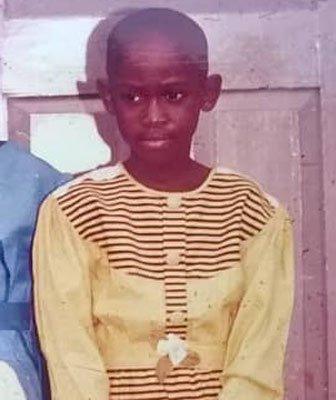
Some of Kantengwa's earliest memories are of her father beating her mother, who eventually left home in fear of her life. As a result, at the age of eight, Kantengwa moved to her father's family home in Rwanda - and was raised mainly by her grandmother after her father was killed in the 1994 genocide against the Tutsi.
It was in Rwanda that she was first raped - at the age of 15, by a family member at home, on the night before her final school exams. The next day, after doing her exams, she ran away.
Kantengwa ended up in the Rwandan capital, Kigali, where she took refuge in a ghetto in the Nyamirambo district - "a very, very crazy place", as she puts it. Here she became a performer in a music group. "Whoever wanted to join would come and you would have a place to sleep, some food," she laughs, giving a rendition of her Shania Twain act.
She wasn't paid for singing but would "just survive by being nice to the people in the neighbourhood... to get some beans, some chapati." The ethos was: "If I get, we share. If you get, we share."
At 17, Kantengwa got a job as a waitress in a club frequented by the rich and famous, and became known as "the beautiful Ugandan girl who speaks English". With her earnings, she was able to get her own apartment.
Things were looking up. So when a woman approached her in the club one night offering her a better life, she felt fate was on her side. She arranged to meet the woman to travel with her to Goma, in the Democratic Republic of Congo (DRC) where, she was told, she "might meet somebody nice… who can take care of you".
The chance of security was too much to turn down. "I was a little girl and just wanted to find a better life for myself, and find money, and one day go and look for my family," she says.
Allow Instagram content?
This article contains content provided by Instagram. We ask for your permission before anything is loaded, as they may be using cookies and other technologies. You may want to read Meta’s Instagram cookie policy, external and privacy policy, external before accepting. To view this content choose ‘accept and continue’.

On her first night in DRC, "wearing a very beautiful blue dress, spaghetti straps, with a side cut" Kantengwa was taken to a restaurant, to dine with the woman she'd met, her friends, and the owner. After dinner, the plan was to go to a nearby nightclub. She wanted to go with the other women, but they insisted she stay behind and travel there with the restaurant owner. She anxiously accepted the plan, though she now understands that "these were older women, they knew why they had taken me there".
When the restaurant owner drove past the nightclub, Kantengwa recalls exclaiming, "No, no, no, no, stop, the club is over here!" The man explained that because he was married he didn't want people at the club see him, and insisted on parking around the corner.
Kantengwa never made it to the club. On the short walk, somebody hit her on the head and knocked her unconscious. Kantengwa generally tries not to think - let alone talk - about the incident. "When I woke up, I had an AK47 on my head," she says. Two army officers then raped her, one at a time, while the other held the gun to her head.
Bleeding and muddied, Kantengwa walked back to the hotel. She guesses the women "got money from the owner of the restaurant" and then left her "because I was the trophy, the diamond they had brought for this guy". After identifying her rapists to the police, she returned to Kigali, intending to travel from there to Kampala, Uganda, in search of her mother and sister, and some stability.
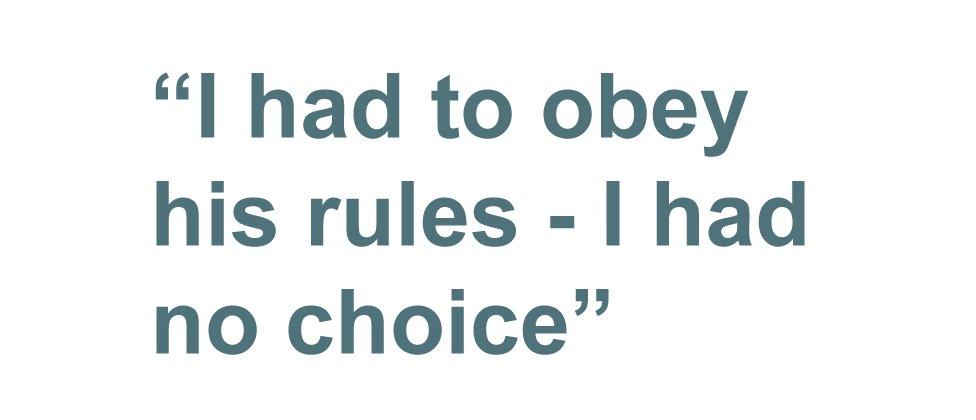
With the help of a foreigner, Max (not his real name), who she'd met on her first night in Goma, Kantengwa succeeded in tracing them.
"He was like, 'I got your sister, I got your mother, so now everyone is fine. I want you to come to Kampala so you can be my girlfriend,'" says Kantengwa.
She was attracted to this dynamic character, but describes her relationship as "jumping into another fire… not the fire of being raped left, right and centre, but the fire of a man that is now obsessed with you".
Max supported Kantengwa financially, but in return expected her not to go out alone. He banned her from having a phone or working. "I had to obey his rules," Kantengwa says. "I had no choice."
Her outings involved been taken by Max to see her sister, or accompanying him to high-end restaurants, bars and clubs. It was at these events that Kantengwa began to build up a social group - and get noticed by Kampala's fashion and photography circles. But this infuriated Max. One night he pulled out a gun in public and proceeded to beat her when they got home. She ran away to her sister's, but went back to Max when he apologised.
Allow Instagram content?
This article contains content provided by Instagram. We ask for your permission before anything is loaded, as they may be using cookies and other technologies. You may want to read Meta’s Instagram cookie policy, external and privacy policy, external before accepting. To view this content choose ‘accept and continue’.

"As a young girl you think, 'He's fighting because he loves me.' But when I think about it today I'm like, 'Oh wow that was a very abusive relationship,'" says Kantengwa. She finally ran away after Max slept with her cousin - but then had to hide from him. He would regularly drive round to look for Kantengwa at her sister's house, forcing them both to lie low and pretend that nobody was in.
With Max gone, Kantengwa could finally relax. She moved into a house with a group of female friends and would go out dancing in clubs until five in the morning. Simultaneously, her modelling career took off. She enjoyed the independence this brought her, so when - at 19 - she caught the eye of a wealthy 54-year-old American, Richard Heard, she initially brushed him off.
Heard knew what to offer, however. Kantengwa's mother was seriously unwell at the time. He said he'd take care of her. He also offered to pay Kantengwa's sister's university fees, and to support the whole family.
"I was getting attracted to the way he treated me," says Kantengwa. With years of violence and insecurity behind her, she felt now was her chance at "finally having peace and having a good life without struggling". She felt the financial stability would allow her the freedom to do work she loved, and the idea of "somebody who was taking care of me" was reassuring.
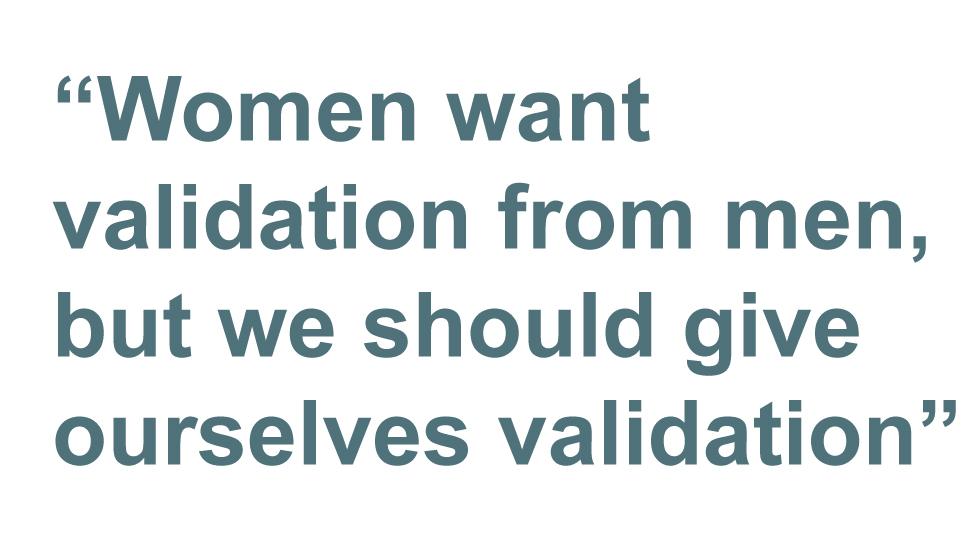
Marrying a rich white man thrust Kantengwa further into the spotlight, however, and exposed her to a blast of public criticism.
"I was judged by the public as a gold-digger," she says. "I was bashed in every corner."
While Kantengwa and Heard had three children together, one adopted, and "a very nice house and cars", she says she was still not free. Her husband didn't want her to go out on her own, she says, and she felt trapped "having to live every day saying to myself, 'Oh, I cannot dress like this because he won't like it, I cannot write this [on social media] because he won't like it.'"
After an 11-year relationship the couple separated and Kantengwa says she now looks forward to expressing herself "without constraints".
But Kantengwa's problems arising from the publication of nude photographs of her have exposed her to more criticism than ever. The shots first emerged in 2013, but were republished last May, leading to her arrest in August under Uganda's strict new Anti-Pornography Act. Although able to travel, she is currently on bail waiting for a court date to be set, and faces a possible two-year sentence.
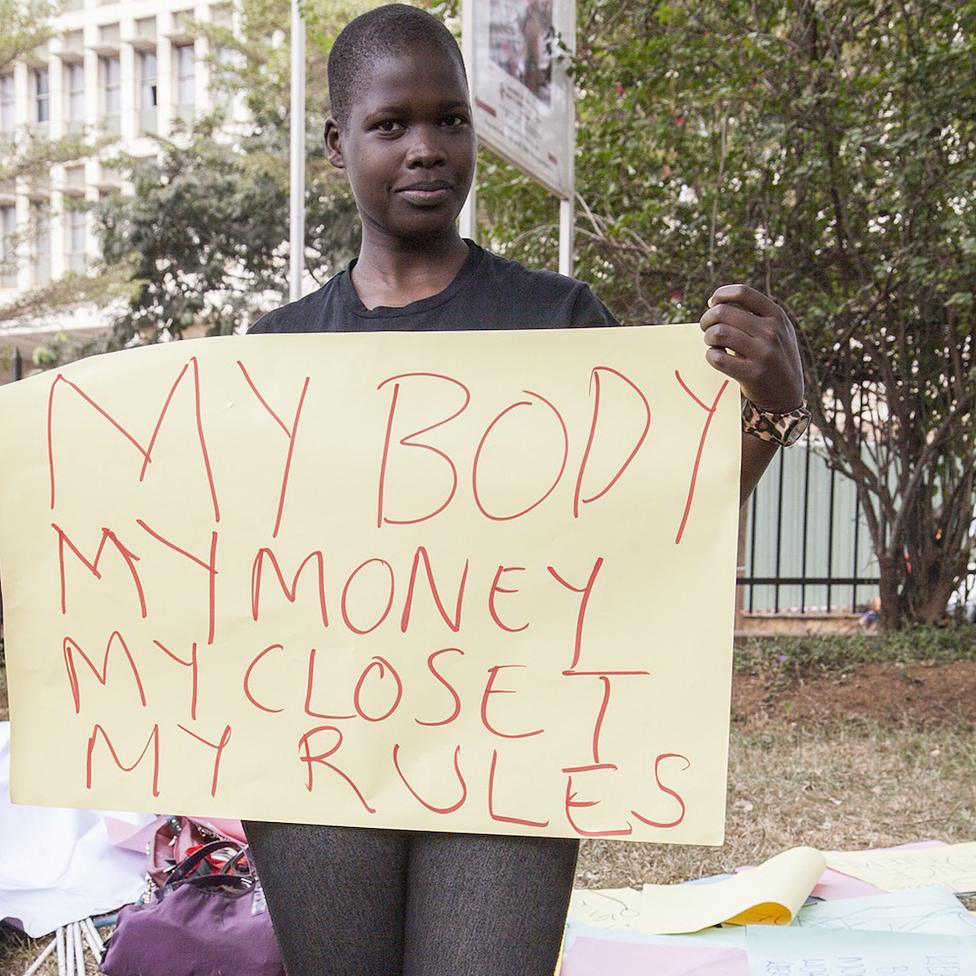
The Anti-Pornography Act initially tried to ban mini-skirts

"So many people have judged me," she says, "the media has bashed me."
On Instagram she has more than 160,000 followers - and while some stay loyal to her, others now dissect her choices in life on social media, leaving disparaging comments.
Last May when the photos were leaked, one commenter accused her of publishing the photographs herself "to show off", another described her genitals as "abnormal". She now finds herself attacked on everything from her intelligence to her weight.
"Some people look up to somebody but they don't know their story," observes Kantengwa. "Or some people end up judging you, and you ask yourself: 'Do they know what I've gone through to be where I am?'"
But speaking out could gain her more enemies than fans.
Women the world over are often blamed for violence against them, and in Uganda legislation has fuelled this. The government attempted to use the Anti-Pornography Act to ban women from wearing miniskirts but then back-pedalled when they started getting attacked and undressed in the street. More recently it has used the act to arrest victims of revenge porn. Archaic laws also remain in place which allow courts to favour men in cases of marital rape.
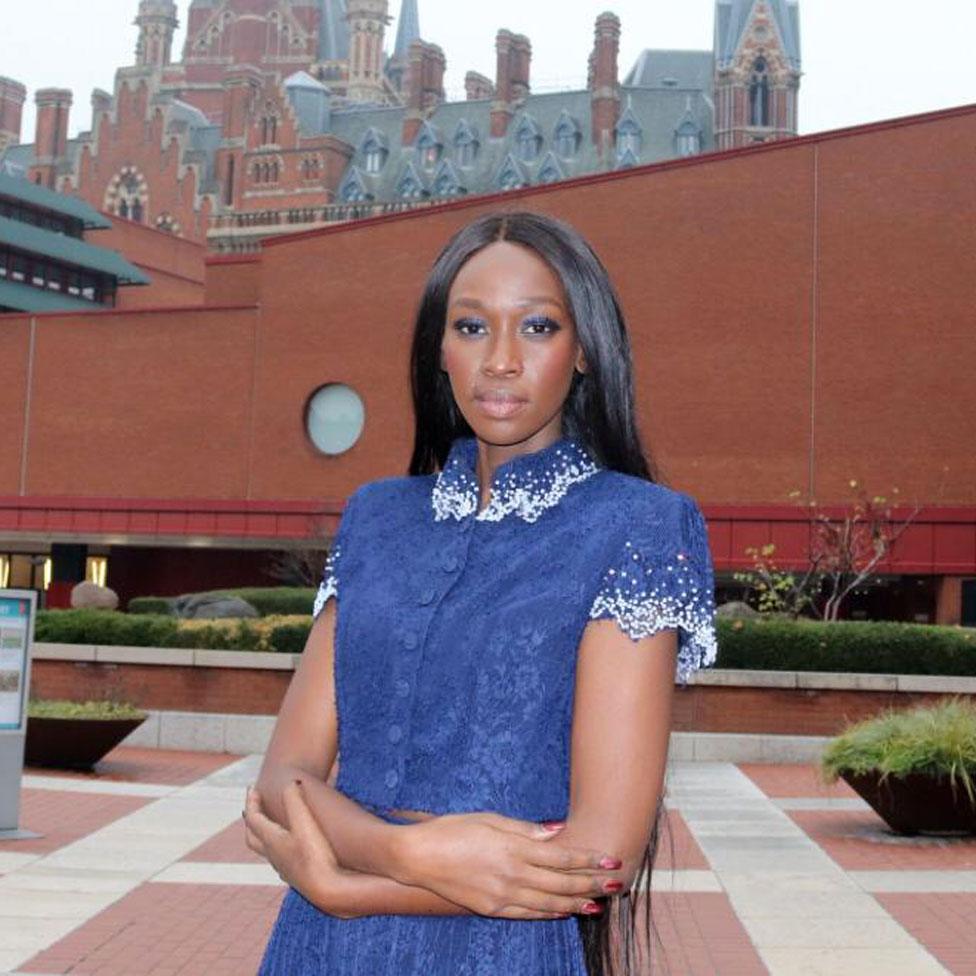
Judith Kantengwa / Heard in London in the borrowed £50,000 dress

Still, Kantengwa, who has noted the power of the #MeToo movement, hopes she can inspire women and girls to come out and tell their stories.
"If we have more people willing to listen and believe… that would make life much easier for women," she says.
She doesn't blame women for having been among her harshest critics.
"They are fighting because men are making us fight," she says. "Women want validation from men, but we should give ourselves validation."
Having long searched for a man with whom to "live happily ever after", she says she is now "living my best life not controlled by my past or any man".
Instead of seeking security from men, she wants women to feel: "You know what? I'm going to love me, I'm going to love my friend… and we're going to team up and we're going to make a better world for everyone."
"I want to stand up for every woman that is out there who is going through something who cannot come out and say it," says Kantengwa. "I want to help them, I want to take their hand."
You may also be interested in:
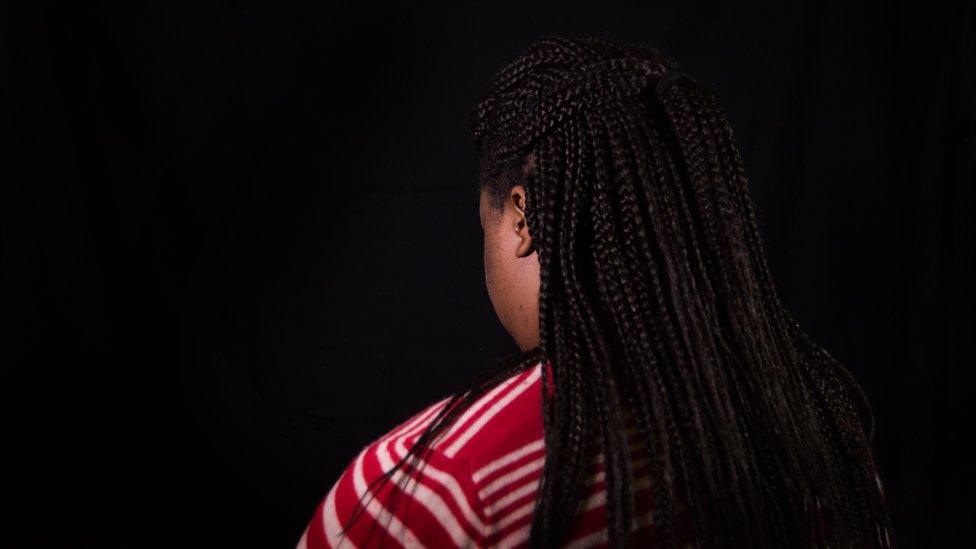
They often fled their homelands to escape sexual abuse - but for many asylum seekers, it continues in the UK. Fear of deportation typically means they don't tell police, but one effect of the #MeToo revelations is that they have now begun to talk about their experiences among themselves.
Secret world: The women in the UK who cannot report sexual abuse
Join the conversation - find us on Facebook, external, Instagram, external, YouTube, external and Twitter, external.
